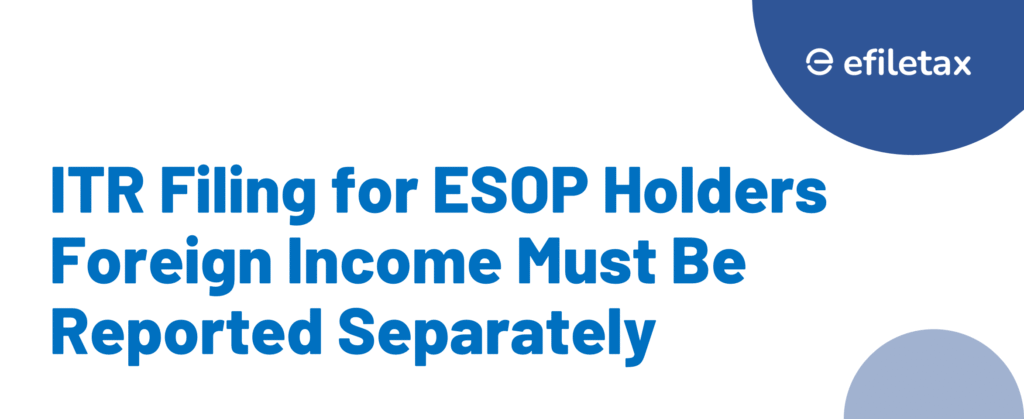
ITR Filing for ESOP Holders with Foreign Income
If you’ve received ESOPs from a foreign company, your ITR isn’t just a regular return — you need to disclose foreign income, assets, and dividends under specific schedules. Failure to do so could trigger scrutiny, penalties, or even notices under the Black Money Act.
This guide simplifies how to file your ITR as an ESOP holder with foreign income, using CBDT rules and expert inputs.
Who Needs to Report?
You must file Schedule FA (Foreign Assets) and Schedule FSI (Foreign Source Income) if during the year you:
- Held ESOPs/RSUs in a foreign company
- Sold foreign shares and earned capital gains
- Received dividends from such shares
- Had any other foreign account or asset, including ESPP holdings
- Received freelance or consulting income from abroad
Key Schedules to Fill in Your ITR
| Schedule | What to Disclose | Example |
|---|---|---|
| FA | Foreign shares, ESOPs, RSUs, overseas brokerage accounts | RSUs granted by Google US |
| FSI | Foreign-sourced dividends, capital gains | Dividend from Meta shares |
| TR | Taxes paid outside India | 25% tax withheld in the US |
| CG | Capital gains from sale of ESOP shares | Sale of Amazon RSUs in FY |
| BP (if applicable) | Freelance income from foreign clients | ₹5 lakh from US-based client |
Ensure correct reporting even if the foreign income is exempt or taxed abroad.
Focus Keyphrase: ESOP foreign income
How to File ITR with ESOP Foreign Income – Step-by-Step
- Identify Type of Income
- Dividends: Taxable in India
- Capital Gains: Taxed as per holding period
- Business Income: Offer under ‘Profits & Gains’
- Salary (if ESOP exercised): Taxed under ‘Salaries’
- Fill Schedule FA (Foreign Assets)
- Mention country, company name, type of asset
- Disclose year-end holding and peak value
- Fill Schedule FSI (Foreign Source Income)
- Mention gross income from each country
- Specify if it’s taxed in India or only abroad
- Claim Relief in Schedule TR (Tax Relief)
- Use DTAA Article (typically Article 10 or 13 for capital gains/dividends)
- Credit available for tax paid abroad
- Cross-verify with Form 67
- Mandatory for claiming foreign tax credit
- File before filing the ITR
Expert View
“Many salaried taxpayers ignore ESOP sale or dividends if they’re credited abroad. But income tax liability arises the moment you’re a tax resident of India. Always disclose foreign income, even if it’s taxed overseas.”
— CA R. Shankar, ITR Consultant
Common Mistakes to Avoid
- Not reporting RSUs/ESOPs under Schedule FA
- Ignoring foreign dividend income assuming DTAA exempts it
- Claiming FTC without filing Form 67
- Using the wrong schedule (e.g., clubbing ESOP sale under salary)
Real-World Example
Case:
Mr. X is employed with a US-based company. He exercised RSUs worth ₹4.2 lakh, sold shares worth ₹6.5 lakh, and received ₹25,000 as dividend. He must:
- Show ₹25,000 under “Income from Other Sources”
- Report capital gains in Schedule CG
- Fill Schedule FA, FSI, and TR
- Submit Form 67 for tax withheld by the US
Legal & CBDT Guidelines
- Schedule FA and FSI are part of ITR-2/3 – mandatory for residents with foreign income/assets
- Form 67 notified via Rule 128 for foreign tax credit
- Black Money Act, 2015 imposes harsh penalties for undisclosed foreign assets – up to ₹10 lakh per default
CBDT FAQ Reference: https://incometaxindia.gov.in
Filing Tip from Efiletax
Always convert foreign currency at SBI TT buying rate as on date of income. Keep a copy of:
- Tax deduction proof from foreign entity
- Bank statements or brokerage slips
- ESOP vesting and sale documents
Efiletax makes this process simpler with guided filing options. Talk to our expert today.
FAQs
Q1. I have foreign ESOPs but haven’t sold them. Do I need to report?
Yes. You must disclose holding under Schedule FA even if not exercised or sold.
Q2. What if my dividend is reinvested?
Still taxable. Dividend income is taxable in India whether received or reinvested abroad.
Q3. Can I use ITR-1 if I have only foreign dividends?
No. Use ITR-2 if you have any foreign asset or income.
Summary
Indian taxpayers with ESOP foreign income must report dividends, capital gains, and assets under Schedule FA, FSI, and TR. Missing these could attract hefty penalties under the Black Money Act. File Form 67 to claim foreign tax credit.